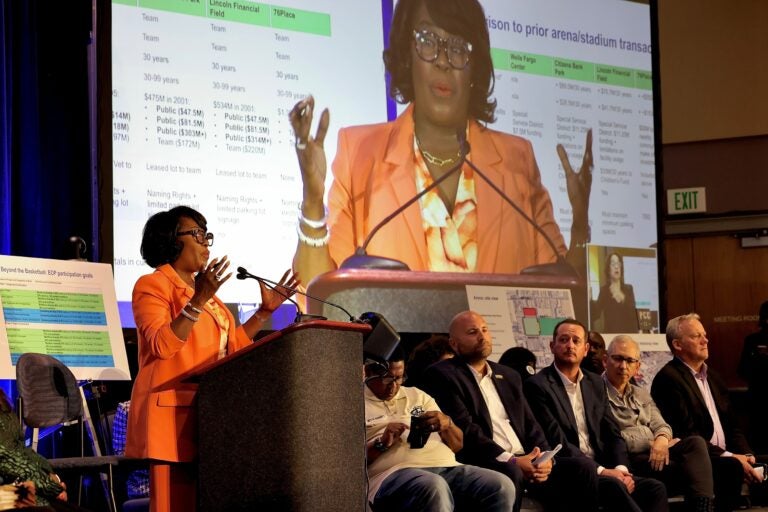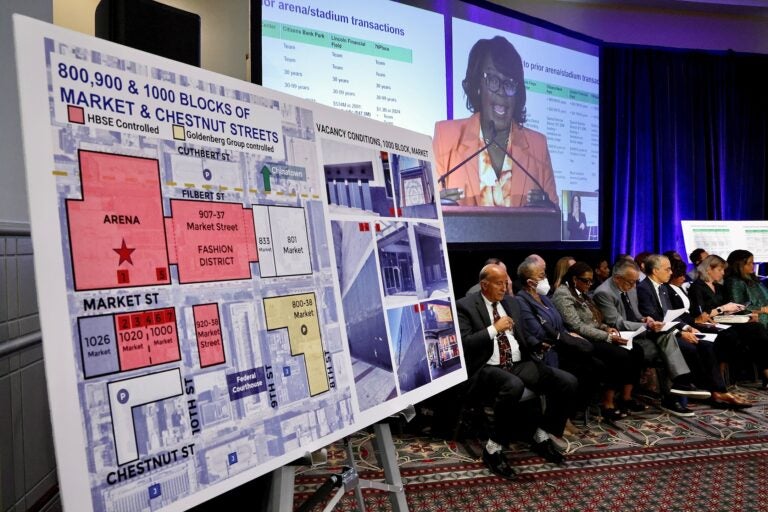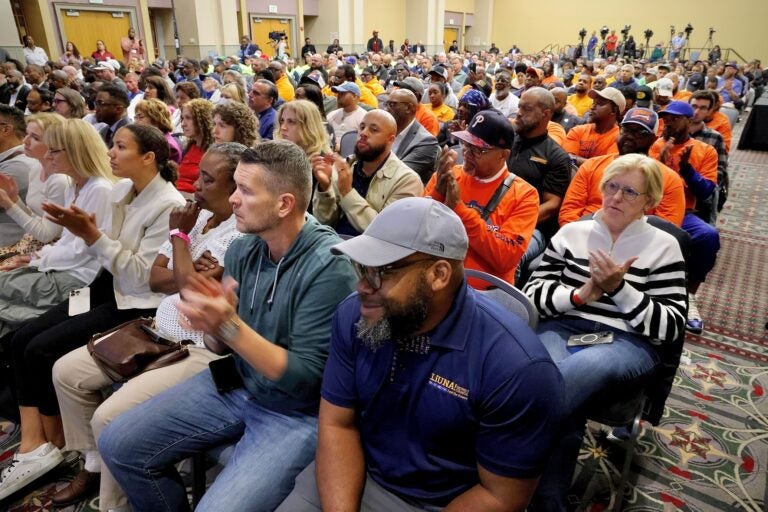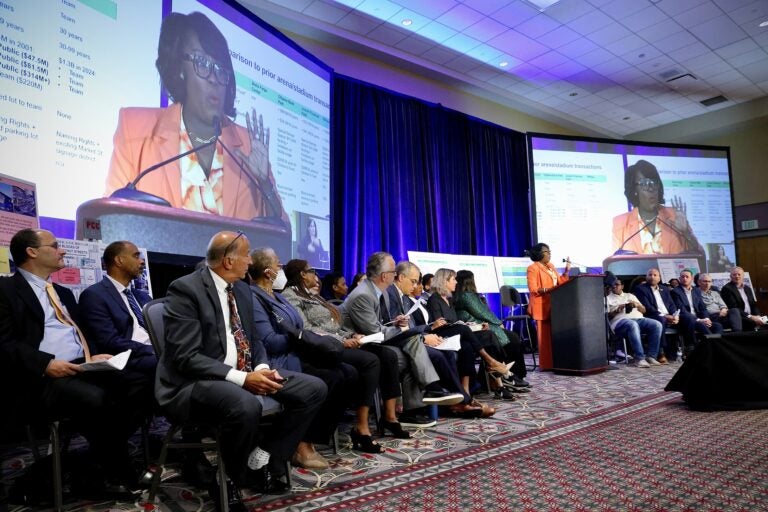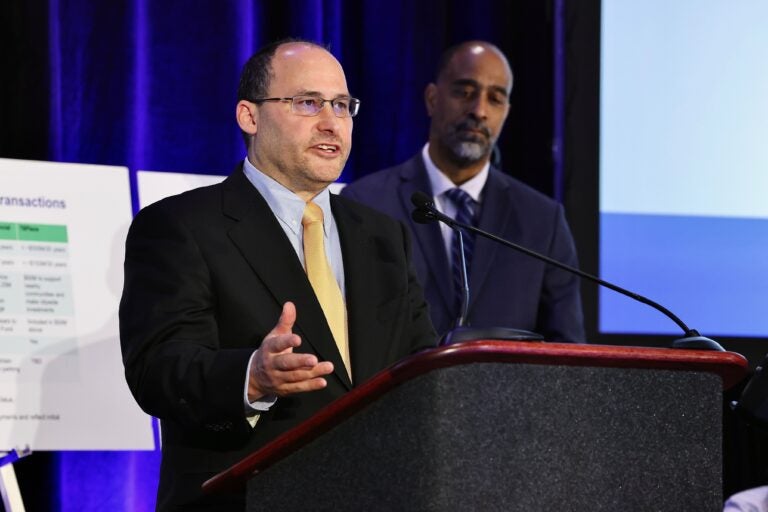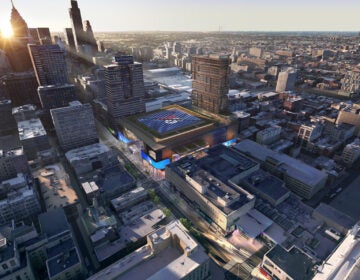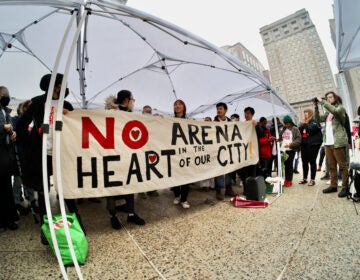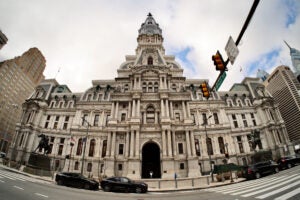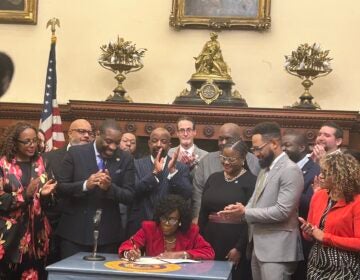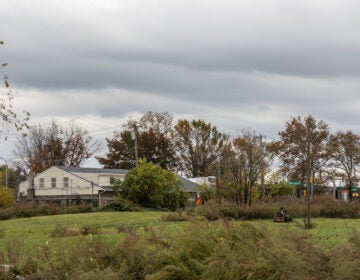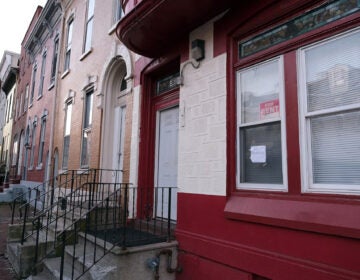Mayor Parker outlines Sixers community benefits agreement, legislative process for $1.55B arena proposal
The agreement, which would keep the Sixers in Philly until at least 2061, was announced Wednesday during a hastily called news conference.
Listen 1:23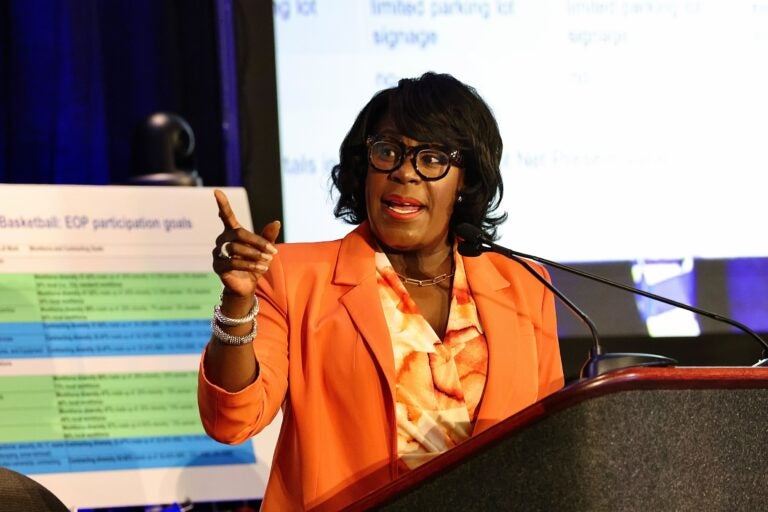
Philadelphia Mayor Cherelle Parker. (Emma Lee/WHYY)
What you need to know
- The 76ers have proposed moving to a new $1.55 billion arena near Chinatown called “76 Place”
- The proposal has drawn swift condemnation, excitement, skepticism — and plenty of buzz
- Black Clergy of Philadelphia has endorsed the project, while a majority of Chinatown businesses and other community members have voiced their opposition
- Philly Mayor Cherelle Parker formally announced her support for the arena last week
Mayor Cherelle Parker said Wednesday the Philadelphia 76ers will spend millions to support the city and its school district, as well as initiatives designed to benefit residents and small businesses — if its controversial proposal to build an arena in Center City is approved.
The announcement came during a hastily called news conference that saw Parker share details of a wide-ranging agreement that would keep the Sixers in Philadelphia until at least 2061. The mayor, who announced her support for the arena last week, also outlined the elements of a community benefits agreement, and the legislative process she hopes will hand the Sixers the approvals they need to build a new arena at 10th and Market streets.
And Parker reiterated her full-throated support Wednesday for the team’s $1.55 billion development proposal.
“Anyone who has any challenges with what is contained in this agreement, you no longer have the Philadelphia 76ers as the villain here. I am Cherelle L. Parker. I am the 100th mayor of the city of Philadelphia. I am proud and take full responsibility for what is included in this agreement,” Parker said inside the Pennsylvania Convention Center.
The briefing, which had a celebratory tone, was open to reporters and the community. Members of the Save Chinatown Coalition, which fiercely opposes the arena, encouraged people to skip the event after they said the Parker administration failed to extend an invite to the coalition or the Chinatown leaders.
The administration also did not reach out directly to leaders of the Washington Square West Civic Association, said President Tami Sortman. On Tuesday, the group posted a letter to social media expressing the group’s opposition to the project. The neighborhood is the second closest to the proposed site after Chinatown.
“The Board does not believe it is in the best interest of the Washington Square West neighborhood. We urge the City Council to vote NO when the proposed Arena legislation is presented to the Council for approval,” read part of the letter.
Parker hails an agreement to be ‘proud of’
During Wednesday’s news conference, Parker and administration officials spent more than two hours outlining the agreement negotiated with the Sixers. The agreement itself was not made immediately available.
Parker said the negotiations were guided by a variety of goals, including careful stewardship of city resources, maximizing the arena’s impact, revitalizing Market East and preserving and enhancing Chinatown.
“This is about access to economic opportunity for all in Philadelphia no matter your race, your class, your socioeconomic status and/or your ZIP code. We made sure that we had you in mind as we worked to hammer out this agreement. It is definitely one I am proud of,” Parker said at the close of the meeting.
The agreement has a provision for a $50 million community benefits agreement. That’s a legally binding document that typically spells out what amenities and mitigations a developer is required to provide in exchange for support for a real estate project.
Half of that funding would go directly to programs and initiatives in surrounding communities — most of it within the first 10 years of the arena’s life. The rest will be used to support citywide initiatives.
The Sixers have also committed to sending roughly $180 million to the city in the form of PILOTS — payments in lieu of taxes. Under the agreement, the team will lease the land for the arena from the city after contributing the parcels for a “nominal value.”
The arrangement means the franchise will not pay real estate taxes if the arena is built, paying PILOTS instead. Critics say the deal equates to a city subsidy because those payments will likely be less than the taxes the team would pay if it owned the land.
The administration’s agreement also includes a so-called “favored nation clause,” which would effectively enable the Sixers to receive taxpayer dollars in the future — if the city subsidizes a different sports facility in Philadelphia after the arena is approved.
A ‘historic agreement’
Parker announced her position on the arena last week via social media, exactly one week after holding a town hall meeting to discuss the development. In a pre-recorded video, she said her administration had reached a “historic agreement” with the Sixers — “the best financial deal ever entered into by a Philadelphia mayor for a local sports arena.” She added that the development will generate millions in tax revenues and create hundreds of jobs.
A spokesperson for 76 DevCo, the team’s development arm, has said the Sixers are “grateful” to the Parker administration for backing the proposal and that they look “forward to advancing to the next steps with City Council.”
On Wednesday, the team reiterated its appreciation for Parker and her administration.
“The Mayor has a vision for how to restore the economic hub of Center City, and we are eager to take part by delivering an arena that will create thousands of jobs while generating new tax revenues for the city, state, and school district,” said David Adelman, chairman of 76 Place, in a statement.
City Council must still pass a package of bills for the arena to become a reality. Parker’s support jumpstarted that process. Parker said Wednesday her administration would transmit enabling legislation for introduction during Council’s stated meeting on Oct. 24.
Lawmakers are expected to consider a total of 11 ordinances and resolutions, including measures related to zoning and planning, as well as neighborhood improvement and financing arrangements tied to the Fashion District mall. Another bill enables the city to accept the arena site from the Sixers. Copies of the draft legislation are now available online on the city’s main website, along with administration’s presentation on the agreement.
Councilmember Mark Squilla, whose district includes the proposed site, will introduce the bills on behalf of the administration. He has vowed to give the community 30 days to review the legislation before introduction. He said this week the language of those bills may be altered to reflect concerns raised by stakeholders in the coming weeks.
The Sixers have said they need approval to build the arena by the end of the year to stay on track to open the 18,500-seat facility in 2031 — the final year of the team’s lease at the Wells Fargo in Center City.
Right now, the City Council’s final regular meeting before the holidays is Dec. 12.
Since announcing the project more than two years ago, the team has said a downtown arena would help revitalize the blocks east of City Hall, a stretch that has struggled to thrive for decades. In last week’s video, Parker echoed that argument, saying the arena “represents the start of an unprecedented revival of Market East.”
The Philadelphia Building and Construction Trades Council — an influential umbrella group of more than 50 labor unions — has supported the proposal from the start. The council was the first to endorse Parker’s run for mayor last year.
Opponents say the arena represents an “existential threat” to Chinatown. They argue small businesses will suffer due to increased traffic congestion caused by the arena, and that the project will likely raise property values that will displace longtime residents.
Vivian Chang, executive director of Asian Americans United, criticized the agreement as hastily reached and without proper research into what the arena’s construction could do to the surrounding area.
“It is outlandish that the mayor is unilaterally trying to impose a CBA on a project that lacks even the most basic studies on housing and rent costs, impacts on small businesses, livability, and transit access – issues that will impact the city for years to come, between multiple years of construction and long-term damage to traffic flow and access to emergency healthcare,” Chang said in a statement. “We are united in opposition to the arena and the rushed, haphazard process surrounding it.”
An impact study the city released last month found the arena “could potentially result in the loss of Chinatown’s core identity and regional significance.” The same analysis found the potential impact on Market East to be “inconclusive.”
 This story is a part of Every Voice, Every Vote, a collaborative project managed by The Lenfest Institute for Journalism. The William Penn Foundation provides lead support for Every Voice, Every Vote in 2024 and 2025 with additional funding from The Lenfest Institute for Journalism, Comcast NBC Universal, The John S. and James L. Knight Foundation, Henry L. Kimelman Family Foundation, Judy and Peter Leone, Arctos Foundation, Wyncote Foundation, 25th Century Foundation, and Dolfinger-McMahon Foundation.
This story is a part of Every Voice, Every Vote, a collaborative project managed by The Lenfest Institute for Journalism. The William Penn Foundation provides lead support for Every Voice, Every Vote in 2024 and 2025 with additional funding from The Lenfest Institute for Journalism, Comcast NBC Universal, The John S. and James L. Knight Foundation, Henry L. Kimelman Family Foundation, Judy and Peter Leone, Arctos Foundation, Wyncote Foundation, 25th Century Foundation, and Dolfinger-McMahon Foundation.
To learn more about the project and view a full list of supporters, visit www.everyvoice-everyvote.org. Editorial content is created independently of the project’s donors.

Get daily updates from WHYY News!
WHYY is your source for fact-based, in-depth journalism and information. As a nonprofit organization, we rely on financial support from readers like you. Please give today.




